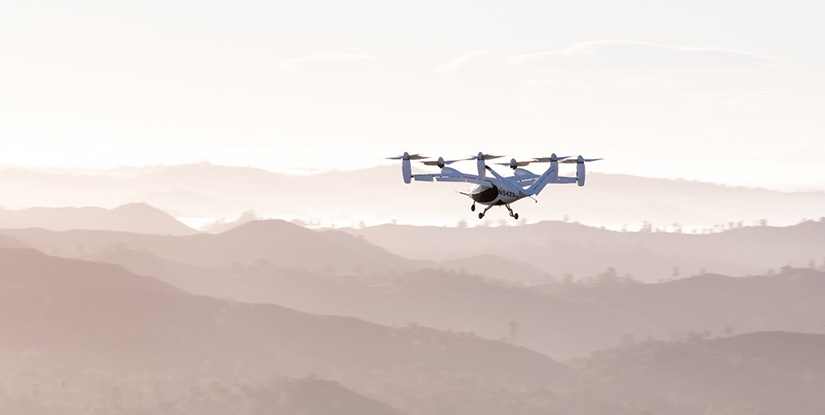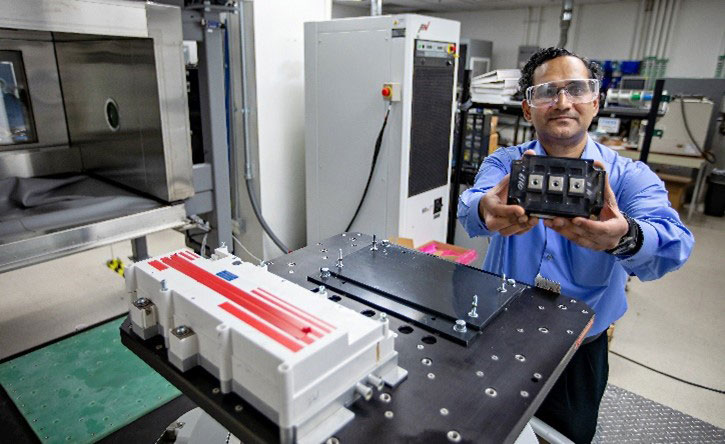Air Force Accelerator Adds NREL for Sustainable Aviation Expertise

The National Renewable Energy Laboratory (NREL) is enthusiastically supporting development of electric vertical take-off and landing (eVTOL) technologies, and a new collaboration with the U.S. Air Force is taking that research to new heights. NREL is contributing to the Air Force's AFWERX division, which leverages research laboratories and expertise throughout the United States to accelerate commercial progress in technologies that could have long-term military applications.
In 2020, AFWERX launched Agility Prime, a project to engage the rising eVTOL industry in the United States and help lift up smaller companies that might benefit from technical validation. NREL has also entered the eVTOL space with pioneering studies that evaluate its techno-economic, environmental, and security aspects. NREL is currently applying that experience to Agility Prime by supporting and validating project concepts, developing analysis tools, and providing AFWERX with subject matter expertise.
"EVTOL is a disruptive transportation technology that builds upon many of NREL's core areas of expertise including hydrogen fuel cells, electric motors, batteries, and charging systems. We've aggressively pursued collaboration with government and industry leaders because we want to lead the efficient intro of transformative technologies," said Tony Markel, NREL project lead for the AFWERX collaboration.
Agility Prime is centered on electric and hybrid electric aircraft technologies that can assist Air Force missions and operations, including common needs like moving supplies or transporting people hundreds of miles. This bucket of technology includes fueling methods, aircraft designs, and all subsystems and infrastructure. The Air Force is drawing on extensive research teams and facilities—including a brand-new, 30,000-square-foot hangar and collaboration space—to accelerate everything eVTOL.

NREL's leadership similarly extends across nearly all of advanced mobility. The laboratory is investigating sustainable aviation fuels, the cybersecurity of charging infrastructure, the opportunity for regional air transit, and more. On related subjects, NREL is a recognized leader in electric grid integration, power electronics, and renewable energy technologies. With this expertise, NREL has been contributing scientific guidance and will also provide a space for design and validation.
To date, NREL has hosted a series of seminars on subjects related to Agility Prime. These sessions covered hydrogen, energy storage, power electronics, and charging systems. At the start of Agility Prime, NREL also supported as a reviewer of project submissions and designs. As NREL continues to assess project concepts, its researchers are helping develop the right modeling and simulation tools to benchmark and evaluate the emerging eVTOL industry.
Tools To Assess Advanced Mobility
Besides building new hardware, the AFWERX collaboration is generating new tools to assess eVTOL emissions. NREL developers and partners are augmenting Agility Prime's toolset with simulation software to support Agility Prime's concept explorations and to compare and strategize operational benefits of various technologies.
One such tool builds off a design software called Multi-Attribute Tradespace Exploration, which enables complex comparisons of the relationships between various solutions, benefits, and costs of solutions, including eVTOLs. The additional module that NREL has now developed introduces life-cycle analysis to the explorer software, allowing Agility Prime participants to screen environmental and emissions outcomes across various strategies.
The team is also considering ways to leverage NREL's own Engage™ software for energy system modeling to assist with scenario planning. The new tool would make it possible for the Air Force to simulate operational scenarios and energy strategies. Engage allows users to model complicated energy flow decisions, and this potential buildout would add an Air Force-specific application to study trade-offs.
Just the Beginning
Hybrid and electric aviation technology is an energized and emerging market, with some of the program's more advanced commercial partners targeting market entry in 2024 and 2025. Through support and partnerships, Agility Prime has continued accelerating the industry at all levels, from airframe manufacturers to subsystem and infrastructure providers. With NREL's technical knowledge and added tools, AFWERX and the young commercial sector can quickly move products through design, development, and deployment.
Learn more about NREL's sustainable aviation research. And sign up for NREL's quarterly transportation and mobility research newsletter, Sustainable Mobility Matters, to stay current on the latest news.
Last Updated May 28, 2025
